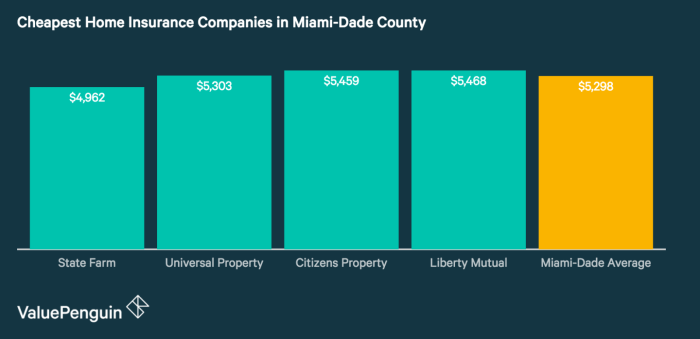Navigating the Florida home insurance market can feel like traversing a dense jungle, especially when searching for affordable coverage. High premiums and frequent storms make finding cheap home insurance in Florida a significant challenge for many homeowners. This guide cuts through the complexity, offering practical strategies and insights to help you secure the best possible protection without breaking the bank.
We’ll explore the key factors influencing insurance costs, compare different policy types and insurers, and provide actionable tips to lower your premiums. From understanding deductibles and coverage limits to utilizing available resources and asking the right questions, we aim to empower you to make informed decisions and secure the most suitable and affordable home insurance for your needs.
Understanding the Florida Home Insurance Market

Navigating the Florida home insurance market requires understanding several key factors that significantly impact premiums. The state’s unique geographic location and susceptibility to hurricanes, along with the increasing frequency and severity of these storms, play a dominant role in shaping the cost and availability of insurance. Furthermore, factors such as the age and condition of your home, its location, and the coverage you choose also contribute to the overall price.
Factors Influencing Florida Home Insurance Costs
Several interconnected factors determine the cost of home insurance in Florida. Hurricane risk is paramount; properties in coastal areas or those deemed more vulnerable to storm surge face significantly higher premiums. The age and condition of your home also matter; older homes with outdated building materials or insufficient hurricane protection may be considered higher risk. Your credit score can influence premiums, as insurers often use it as an indicator of risk. Finally, the amount of coverage you select directly impacts your premium; higher coverage levels naturally translate to higher costs. For example, a home located directly on the coast in a hurricane-prone zone with an older roof and a lower credit score will likely pay substantially more than a similar home located inland with newer construction and a high credit score.
Types of Home Insurance Policies in Florida
Florida offers several types of home insurance policies to cater to diverse needs and budgets. The most common is the standard HO-3 policy, which provides comprehensive coverage for damage to your home and belongings from various perils, excluding those specifically excluded in the policy. HO-A policies are more limited in coverage, typically covering only specific named perils, making them generally less expensive. HO-6 policies are specifically designed for condominium owners, offering coverage for the interior of their unit and personal belongings. Choosing the right policy depends on your specific circumstances and risk tolerance. A homeowner in a high-risk area may opt for a broader, more comprehensive policy, while someone in a lower-risk area may find a more basic policy sufficient.
Typical Coverage Included in Basic Florida Home Insurance Policies
A basic Florida home insurance policy typically includes coverage for dwelling damage, meaning damage to the structure of your home from covered perils such as fire, wind, and hail. It also commonly includes coverage for other structures on your property, such as a detached garage or shed. Personal property coverage protects your belongings within your home from covered perils. Liability coverage protects you financially if someone is injured on your property or if you cause damage to someone else’s property. Additional living expenses coverage provides temporary housing and related expenses if your home becomes uninhabitable due to a covered event.
Common Exclusions Found in Florida Home Insurance Policies
It’s crucial to understand what’s not covered by your Florida home insurance policy. Common exclusions include damage caused by floods, earthquakes, and normal wear and tear. Pest infestations, such as termite damage, are typically excluded unless specifically endorsed. Neglect or intentional acts that cause damage to your property are also not covered. Furthermore, many policies exclude damage from specific named storms if the insured fails to adequately protect their property from damage during the storm. For example, failing to board up windows before a hurricane could result in the damage from that storm being excluded from the policy.
Finding Affordable Home Insurance Options
Securing affordable home insurance in Florida can feel like navigating a complex maze, but with the right approach, finding suitable coverage within your budget is achievable. Understanding the various methods for comparison, implementing cost-saving strategies, and diligently comparing quotes are crucial steps in this process.
Finding the best deal involves a multi-pronged strategy. This section details effective methods for finding cheap home insurance, providing tips to reduce premiums, and emphasizes the critical role of comparing quotes from multiple insurers. We’ll also provide a comparative analysis of three affordable insurers to illustrate the differences in coverage and pricing.
Methods for Finding Cheap Home Insurance in Florida
Several avenues exist for finding affordable home insurance in Florida. These include utilizing online comparison websites, working directly with independent insurance agents, and contacting insurers directly. Online comparison tools allow you to input your details and receive multiple quotes simultaneously, facilitating quick comparisons. Independent agents, on the other hand, can leverage their expertise and relationships with various insurers to secure competitive rates and policies tailored to your needs. Directly contacting insurers allows for a more personalized approach, enabling detailed discussions about your specific requirements. Each method offers advantages depending on your preferences and time constraints.
Tips for Reducing Home Insurance Premiums in Florida
Several proactive steps can significantly reduce your home insurance premiums. These include improving your home’s security features, such as installing a security system or impact-resistant windows, and raising your deductible. A higher deductible means lower premiums, but it also means you’ll pay more out-of-pocket in case of a claim. Maintaining good credit can also positively impact your insurance rates, as insurers often consider credit history a measure of risk. Bundling your home and auto insurance with the same provider often results in discounts. Finally, regularly reviewing your policy and coverage needs can help you identify areas where you can adjust coverage to better suit your current circumstances and potentially lower your costs.
The Importance of Comparing Quotes from Multiple Insurers
Comparing quotes from multiple insurers is paramount to securing the most affordable home insurance. Insurers use different rating models and offer varying levels of coverage, leading to significant price discrepancies. Failing to compare quotes could mean overpaying for similar coverage. It’s recommended to obtain at least three to five quotes before making a decision to ensure you’re getting the best possible rate. This process helps identify not only the cheapest option but also the best value for your money, considering the coverage offered for the price.
Comparison of Affordable Insurers
The following table compares three affordable home insurance providers in Florida, highlighting key features and estimated pricing. Note that prices are estimates and can vary based on individual circumstances, location, and coverage choices.
| Insurer | Estimated Annual Premium (Example) | Key Features | Customer Service Rating (Example) |
|---|---|---|---|
| Insurer A | $1200 | Basic coverage, online portal, 24/7 claims support | 3.8 stars |
| Insurer B | $1500 | Comprehensive coverage, discounts for bundled services, dedicated agent | 4.2 stars |
| Insurer C | $1350 | Mid-range coverage, flexible payment options, strong financial stability | 4.0 stars |
Understanding Policy Details and Coverage

Choosing the right home insurance policy in Florida requires careful consideration of its details. Understanding the specifics of your coverage is crucial to ensure you’re adequately protected against potential losses. This section will Artikel key aspects to examine and explain the claims process.
Essential Policy Aspects
Before finalizing your home insurance policy, several critical elements warrant careful review. These elements directly impact your level of protection and financial responsibility in case of a covered event. A thorough understanding of these details is vital for making an informed decision.
- Coverage Types: Policies typically include dwelling coverage (the structure itself), personal property coverage (your belongings), liability coverage (protecting you from lawsuits), and additional living expenses (covering temporary housing if your home is uninhabitable). Understanding the limits of each coverage type is essential.
- Deductibles: Your deductible is the amount you pay out-of-pocket before your insurance coverage kicks in. Higher deductibles usually result in lower premiums, but you’ll pay more in the event of a claim. Carefully consider your financial capacity to handle a potential deductible.
- Coverage Limits: These are the maximum amounts your insurer will pay for covered losses. Ensure your coverage limits are sufficient to rebuild your home and replace your belongings, considering potential inflation and rising construction costs. Underinsurance can leave you with significant financial burdens.
- Exclusions: All policies have exclusions—events or damages not covered. Common exclusions include flooding (requires separate flood insurance) and earthquakes. Review the policy carefully to understand what is and isn’t covered.
- Endorsements and Riders: These are additions to your basic policy that provide extra coverage for specific risks, such as valuable jewelry or water backup. Consider adding endorsements to address any unique vulnerabilities of your property or possessions.
Deductibles and Coverage Limits
Understanding your deductible and coverage limits is paramount. The deductible represents your initial financial responsibility in a claim. A $1,000 deductible means you’ll pay the first $1,000 of repair costs before your insurance coverage begins. Coverage limits define the maximum amount your insurer will pay for a specific type of loss. For example, a $250,000 dwelling coverage limit means that’s the maximum your insurer will pay to rebuild your home in case of a total loss. Choosing appropriate levels depends on your property’s value, your risk tolerance, and your financial capacity. A significantly underinsured home could leave you with substantial out-of-pocket expenses after a major event.
Filing a Home Insurance Claim
Filing a claim involves promptly notifying your insurer after a covered event. Most insurers have a 24/7 claims hotline. You’ll typically need to provide details of the incident, including date, time, and cause. The insurer will then assign an adjuster to assess the damage and determine the amount payable under your policy. Providing comprehensive documentation, such as photos and repair estimates, will expedite the process. Be prepared to answer questions about the incident and your policy details. Remember to keep detailed records of all communication and documentation throughout the claims process.
Common Claim Scenarios in Florida
Florida’s unique climate and geographical location make certain types of claims more common.
- Windstorm Damage: Hurricanes and strong thunderstorms can cause significant damage to roofs, windows, and siding. Comprehensive windstorm coverage is crucial for Florida homeowners.
- Water Damage: Heavy rainfall and flooding (requiring separate flood insurance) can lead to substantial water damage to your home’s structure and belongings. Proper drainage and preventative measures are important, but insurance coverage is essential.
- Lightning Strikes: Lightning can cause fires, electrical damage, and appliance malfunctions. This highlights the importance of adequate electrical system protection and insurance coverage.
- Theft and Vandalism: Home burglaries and vandalism can result in property loss or damage. Homeowners insurance typically covers these events, subject to policy limits and deductibles.
Concluding Remarks

Finding cheap home insurance in Florida requires diligent research, careful comparison, and a thorough understanding of your coverage needs. By leveraging the strategies Artikeld in this guide—comparing quotes, understanding policy details, and exploring potential savings opportunities—you can significantly increase your chances of securing affordable and comprehensive protection for your home. Remember, a little preparation can go a long way in safeguarding your investment and peace of mind.
General Inquiries
What is the average cost of home insurance in Florida?
The average cost varies significantly based on location, home value, coverage level, and individual risk factors. It’s best to obtain quotes from multiple insurers to determine your specific cost.
Can I get home insurance if I have a history of claims?
Yes, but your premiums will likely be higher. Insurers consider claims history when assessing risk. Be upfront about your past claims when obtaining quotes.
What is a windstorm deductible?
A windstorm deductible is a separate deductible that applies specifically to damages caused by wind or hurricanes. It’s often higher than the standard deductible.
What types of coverage are typically excluded in Florida home insurance policies?
Common exclusions include flood damage (requires separate flood insurance), earthquake damage, and certain types of mold damage. Carefully review your policy for specific exclusions.
How often should I review my home insurance policy?
It’s advisable to review your policy annually, or whenever there are significant changes in your property, such as renovations or additions.